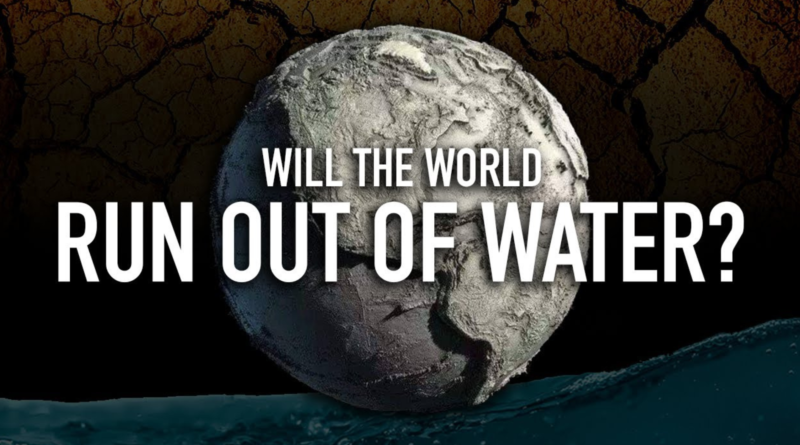WATER CRISIS: WILL THE WORLD RUN OUT OF FRESH WATER?
Water is one of the most important resources for life on Earth. Every human, animal, and plant depends on water to survive. We use it for drinking, farming, cooking, cleaning, and producing almost everything around us. But fresh water, which is safe for drinking and daily use, makes up only about 2.5% of all the water on Earth. The rest is salty ocean water. Out of this small percentage, much of it is trapped in glaciers and ice caps, leaving very little available for human use. This raises a serious question: will the world one day run out of fresh water?
The Growing Water Crisis
In many parts of the world, people already face water shortages. According to global studies, around 2 billion people live in areas with high water stress. Countries in the Middle East, Africa, and South Asia are among the most affected. For example, nations like India, Pakistan, and Iran face severe groundwater depletion because people pump water faster than nature can refill it.
Population growth is another big reason behind the crisis. As the world population moves toward 9–10 billion by 2050, the demand for water will increase sharply. Cities are expanding, industries are growing, and agriculture requires huge amounts of water to feed everyone. If water use is not managed carefully, the crisis will deepen.
Causes of Water Scarcity
Climate Change – Rising global temperatures affect rainfall patterns. Some regions face droughts while others experience floods. Melting glaciers, which provide fresh water to rivers, are shrinking rapidly. This reduces the long-term supply of water.
Overuse of Groundwater – Farmers and industries often extract underground water faster than it can be naturally restored. This has led to falling water levels in countries like India, China, and the United States.
Pollution – Rivers, lakes, and groundwater are polluted by industrial waste, sewage, and chemicals. Polluted water cannot be used for drinking or farming without expensive treatment.
Deforestation – Cutting down forests reduces rainfall and lowers the ability of soil to hold water, worsening droughts.
Poor Management – In many countries, water is wasted due to old infrastructure, leaking pipelines, and lack of recycling systems.
The Impact of Water Shortages
When water becomes scarce, it affects all areas of life. Farmers struggle to grow crops, leading to food shortages. Industries cannot run without water, slowing down economies. In some places, water scarcity has even led to conflicts between communities and nations. For example, disputes over rivers such as the Nile in Africa and the Indus in South Asia show how serious the situation can become.
On an individual level, families without access to clean water face health problems. People, especially women and children, spend hours every day collecting water from faraway sources. Dirty water also causes diseases like cholera and diarrhea, which kill thousands of children each year.
Will the World Really Run Out of Fresh Water?
Technically, the Earth will not “run out” of water because water constantly moves through the natural cycle of evaporation, rain, and rivers. But what we may run out of is usable, safe, and accessible fresh water. If current practices continue, many regions could face “Day Zero” situations, where taps run dry and emergency water distribution becomes necessary. Cape Town in South Africa came close to this crisis in 2018.
Solutions to the Water Crisis
Even though the situation is worrying, there are many solutions to prevent a global water disaster:
Water Conservation – People need to use water wisely in daily life. Simple steps like fixing leaks, using water-efficient appliances, and avoiding wastage can make a big difference.
Improved Agriculture – Since farming uses around 70% of fresh water, better irrigation methods like drip irrigation and rainwater harvesting can save large amounts.
Recycling and Reuse – Treated wastewater can be used for farming and industrial purposes. Singapore, for example, recycles wastewater into high-quality drinking water known as “NEWater.”
Desalination – Removing salt from seawater is another option, though it is expensive. Some Middle Eastern countries already rely on this technology.
Protecting Ecosystems – Restoring forests, wetlands, and rivers helps maintain the natural water cycle.
International Cooperation – Since many rivers flow across borders, countries must work together instead of fighting over water rights.
The Role of Individuals
While governments and industries play a big role, individuals also have power to help. Turning off taps while brushing, collecting rainwater, planting trees, and spreading awareness can all add up. Schools, communities, and companies should teach people about the importance of saving water.
Conclusion
The world may not completely run out of fresh water, but large parts of the population could face severe shortages if we ignore the crisis. Water is not just a resource; it is life itself. Protecting it is the responsibility of every person, community, and nation. With smart management, new technologies, and collective effort, the world can avoid a future where fresh water becomes rarer than gold.




